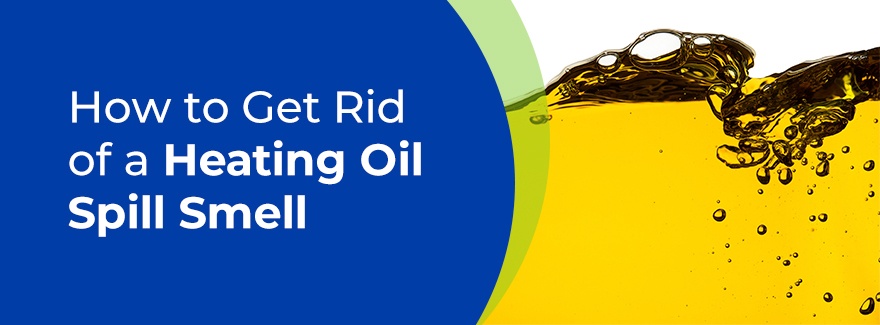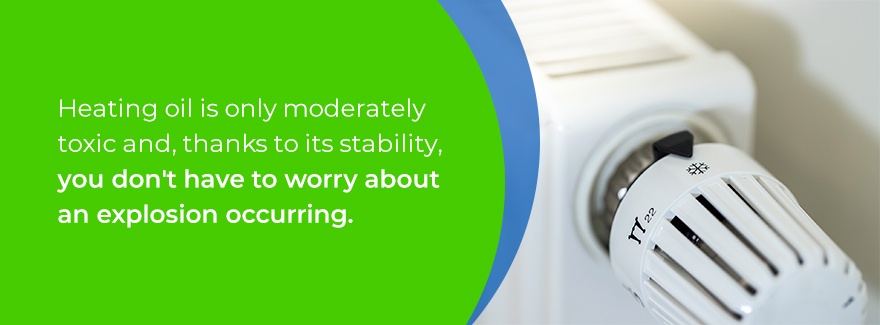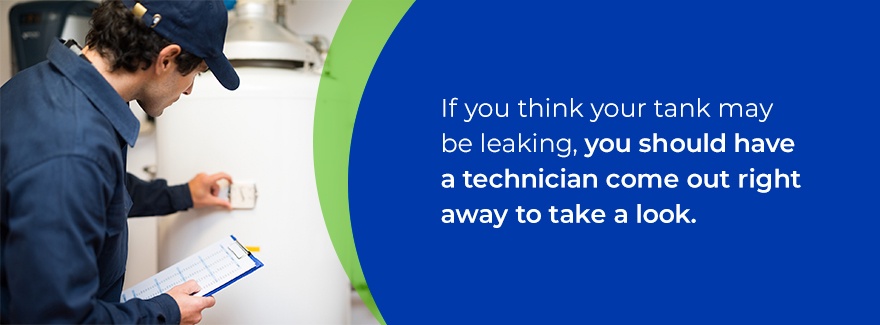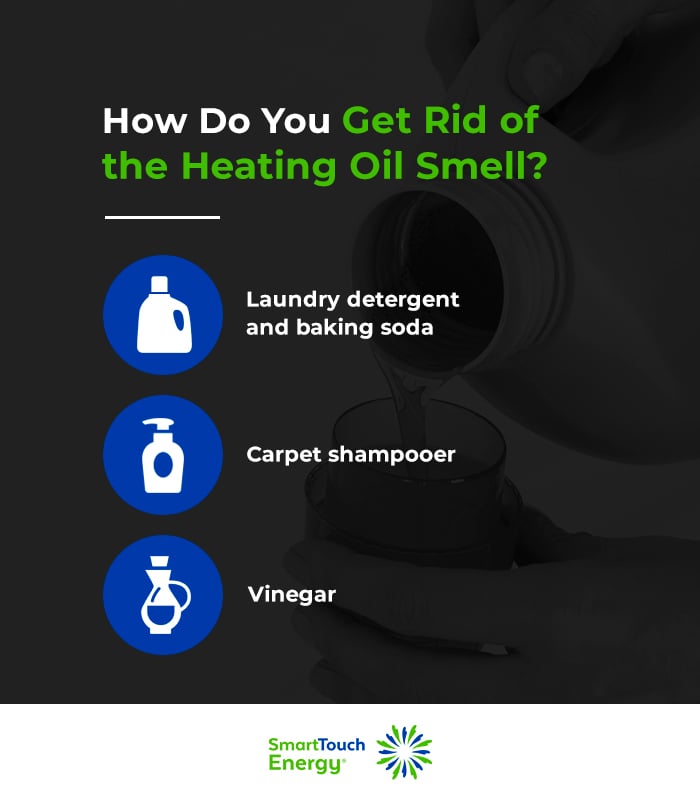
Millions of American homes rely on heating oil to keep them warm during colder months. Heating oil, also known as fuel oil No. 2, has a distinct oil smell, but in most cases, it is well-contained. That means you typically won't notice the smell at all, or will only catch a faint whiff just after getting your tank refilled. When you note a strong oil odor, it is probably due to a more severe issue such as a spill.
- Is It Normal to Smell Heating Oil?
- Is an Oil Smell Dangerous?
- Is There a Leak in the Tank?
- How Do You Clean up a Heating Oil Spill?
- How Do You Get Rid of the Heating Oil Smell?
- What If the Smell Doesn't Go Away?
We're going to talk more about what it means if you're smelling oil, cover the health concerns, and walk you through how to clean up an oil spill and remove a heating oil smell. Keep in mind that home heating oil spills may necessitate some professional help and reporting to the relevant authorities, so it is best to take every possible precaution.
Is It Normal to Smell Heating Oil?
Heating oil does have a distinct odor. Generally, however, you shouldn't smell it in your home. If you do catch a whiff of heating oil, it's likely an indication of a problem, ranging from minor and temporary to more severe and in need of immediate attention. Here are some possible reasons you may be smelling heating oil.
- You recently had your tank refilled: It's normal for a heating oil smell to linger in the air for a few days after getting your tank refilled. The smell shouldn't be strong, and it should disappear within a few days. If the odor isn't going away on its own, whoever filled your tank might have spilled some oil during the filling process, or another issue is causing the oil smell.
- You're turning your furnace on for the first time of the season: It's common for your furnace to produce a burning oil odor when you turn on the heat on that first cold day of the season. If this is the cause of the smell, it should dissipate fairly quickly. If you continue to smell oil, there may be another issue causing the problem.
- It's time to change your furnace filter: In some cases, you might smell heating oil because the furnace filter has become clogged. The simple solution is to change the filter, which you typically need to do every 60 to 90 days. If replacing the filter doesn't take care of the smell, investigate further to see what might be causing the lingering odor.
- There is a problem with the furnace: If your furnace isn't operating efficiently, it could be that some of the oil isn't combusting fully. The leftover oil that doesn't combust can cause a heating oil smell around your furnace. Cracks in the oil burner can also cause oil fumes to escape. If you think your furnace may not be operating correctly, have an HVAC technician come to diagnose the problem.
- The tank is leaking: One of the more severe problems that can cause an odor is if your heating oil tank or the line from your tank to your furnace is leaking. Inspect your tank and look for any oil stains. In some cases, you may have a loose fitting or another problem an HVAC technician can quickly correct. In other cases, you may need to replace your tank.
- Spilled oil: If someone spilled a bit of oil while refilling your tank, this can cause a heating oil odor to linger for a while. We'll talk more about spills later in this post, so you can not only get rid of the odor, but can also keep the spilled oil from doing too much damage to its surroundings.

Is an Oil Smell Dangerous?
Whatever the reason you're smelling heating oil, you may be concerned about the health implications. Fortunately, exposure to heating oil fumes isn't nearly as dangerous as exposure to gas. Heating oil is only moderately toxic and, thanks to its stability, you don't have to worry about an explosion occurring. That said, taking in oil fumes can adversely affect you.
If your tank is outside and you can smell oil from a leak, you should place a high priority on cleaning up the spill. However, this urgency is more for the sake of the environment than it is for your health. Heating oil can poison wildlife and pollute groundwater, which is why you should always clean up spills thoroughly.
The concern for people is when they're inhaling oil fumes in an enclosed space, such as your basement, where many homeowners' oil tanks are. Even in an enclosed space, you may not experience any health hazards from exposure to low concentrations of oil fumes. In the case of exposure to more widespread spills or leaks, however, you may experience the following symptoms:
- Dizziness
- Nausea
- Headaches
- Difficulty concentrating
- Eye, nose, or throat irritation
These are all temporary issues caused by short-term exposure to heating oil fumes. These problems won't affect you long-term. However, if you ignore an ongoing heating oil smell in your home, you could be subject to more severe health problems like high blood pressure, kidney and liver damage, and a decreased capacity for smell and taste. You should always have a professional diagnose the problem if you can't immediately figure out the source of the oil smell and fix it.

Is There a Leak in the Tank?
- Dripping or pooled oil near the tank
- Oil tank lines in poor condition
- Dying grass or plants around an outdoor tank
- Rusty, corroded, or wet spots on the outside of the tank
- A broken or malfunctioning fuel gauge or oil around the gauge
- Snow, ice, or other materials blocking a tank vent
- Oil stains on the ground or floor
Pooled oil or an oil stain can also indicate a spill occurred. In either outcome, you'll want to act immediately to clean up the spilled or leaked oil. However, in the case of a leak, you'll probably be dealing with a small amount that has accumulated drip by drip, whereas with a spill, you may have a more substantial mess on your hands.
How Do You Clean up a Heating Oil Spill?
A heating oil spill isn't as dangerous as many other types of fuel spills, but it can still do a lot of damage to your property. Oil will soak into carpet, concrete, or wood floors and ruin them. The oil will affect anything it touches. Even things like clothes that are in the surrounding area can absorb the oil smell. You'll want to work quickly to clean up an accidental spill.
Of course, the steps you'll need to take will depend in part on the severity of the spill. Was it just a few drops or multiple gallons? Your local laws may require you to report more substantial spills, and you might need to call in professional help to clean it up. Check online with your state government to see if there are any required measures you must take. Some states will also offer financial assistance to homeowners who have experienced an oil spill.
For a spill of any size, you should immediately take these steps.
- Avoid ignition: Turn off or unplug anything in the area that could cause a fire, refrain from smoking, and do not have any open flames around the area. Your instinct may be to light scented candles to help cover the smell, but this is dangerous. Even though heating oil is not as flammable as gasoline, you should take the same precautions you would around a gasoline spill, so you don't risk igniting it.
- Ventilate the area: Ventilation is not a concern for outdoor spills. For spills in a basement, though, you should quickly open windows and close any openings that will allow the oil fumes in your basement to reach other rooms in your house. These include cold-air returns and heat registers. You may also want to close the door to your basement to keep the rest of your home insulated from the oil fumes. Turning on fans can help you provide even more ventilation in the space.
- Keep pets safe: You should keep pets away from the contaminated area. If you have a safe place for them to go outside, put them out while you address the issue or while professionals work on cleaning the spill. Otherwise, keep them indoors, well away from the oil spill, so it won't affect their health.
If you're dealing with a smaller spill you can clean up yourself, take these steps.
- Absorb the oil: Whether inside or outside, you should attempt to stop the oil from spreading and absorb the material. To do this, cover the spilled oil with cat litter, sawdust, or another absorbent material. Once the litter or sawdust has become saturated with the oil, use a shovel to remove it and put it into heavy-duty garbage bags for disposal. If needed, repeat this step until you've absorbed the bulk of the oil.
- Remove damaged materials: An oil spill will usually damage any porous materials in the area that soak up oil, such as flooring, drywall, furniture, and more. You may be able to clean some items that get oil on them, but be sure to safely dispose of anything you can't salvage. Removing these items from the area will help you clean up the oil and start to get rid of the smell.
- Clean the affected surface: At this point, you should only have an oily residue left on the floor. The best way to clean this is with hot water and soap. Be sure to get into every nook and cranny where oil may be present and scrub until there is no oil left. You may need to repeat this cleaning process a few times to remove all the oily residue. While you are cleaning, wear old clothes and shoes you don't mind getting rid of afterward, and use rubber gloves to protect your skin.

How Do You Get Rid of the Heating Oil Smell?
Cleaning up a spill should help you remove the oil, but you may still notice an unpleasant odor in the air from the oil spill. Ventilating the area and closing it off from the rest of the home, as we discussed in the last section, is a great first step toward containing the smell. But now you want to get rid of it. Try using the following methods.
- Laundry detergent and baking soda: One way you can start to cover the smell is by sprinkling powdered laundry detergent or baking soda on the affected area. As with kitty litter and sawdust, this will keep the oil from spreading and will absorb some of the oil. Using a scented soap when you clean the floor can help replace the oil odor with a more pleasant smell.
- Carpet shampooer: The oil smell can soak into carpet, upholstery or other materials in the area, so you may continue to smell the oil even after completing a thorough cleaning. Either dispose of the affected objects or clean them with a carpet shampooer.
- Vinegar: If the oil smell in your home was due to a problem with your furnace and not a spill, you can mitigate it by placing dishes of vinegar near your furnace and in front of each vent. Replace each with a fresh container of vinegar every day until the smell is gone.
What If the Smell Doesn't Go Away?
If you've taken the steps above, and you're still dealing with a lingering oil smell that won't go away, first, you should reevaluate to make sure the oil smell isn't coming from an ongoing problem, such as a leak. If the smell is a remnant of a problem like a spill or a leak you had repaired, inspect the area to see if any traces of oil are causing the lingering odor. If you don't find any oil left to clean up, don't be discouraged. There are other steps you can take.
One thing to try is to place fresh coffee grounds onto paper plates and position them around your basement or wherever the oil smell is. Within a day, you should notice a positive difference. Other traditional methods of improving the fragrance in your home, such as air fresheners, may also help. Some air purifiers can also help remove fumes from the air.
If you're still dealing with ongoing odors, you should contact a professional to diagnose the situation, since it is likely you need to address an issue with your tank or HVAC unit.
Heating Oil Delivery and Services From Smart Touch Energy
Avoiding home heating oil spills and other problems starts with having a heating oil delivery provider you trust to fill your tank with care and to help you maintain the health of your HVAC system.
If you're looking for a home heating oil provider, Smart Touch Energy is your source in the northeast for convenient and reliable heating oil delivery. You can schedule automatic deliveries, one-time deliveries, or emergency deliveries when you're in a pinch. We can also help you with maintaining your HVAC system. Contact us today to learn more, or schedule a heating oil delivery online.





